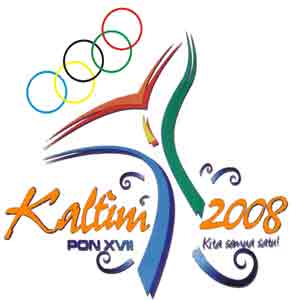
Mixed martial arts (MMA) is a full-contact combat sport based on striking, grappling and ground fighting, incorporating techniques from various combat sports from around the world. The first documented use of the term mixed martial arts was in a review of UFC 1 by television critic Howard Rosenberg in 1993.

Pencak silat is an umbrella term for a class of related Indonesian martial arts. In neighbouring countries, the term usually refers to professional competitive silat. It is a full-body fighting form incorporating strikes, grappling, and throwing, in addition to weaponry. Every part of the body is used and subject to attack. Pencak silat was practiced not only for physical defense but also for psychological ends. There are hundreds of different pencak silat styles and schools which tend to focus either on strikes, joint manipulation, weaponry, or some combination thereof.

The 2011 Southeast Asian Games, officially known as the 26th Southeast Asian Games, or the 26th SEA Games, and commonly known as Jakarta-Palembang 2011, was a Southeast Asian multi-sport event held from 11 to 22 November 2011 in Jakarta and Palembang, Indonesia. It was Indonesia's fourth time to host the Southeast Asian Games, and its first since 1997. Previously, Indonesia also hosted in 1979 and 1987. The capital city of Jakarta hosted all three of the previous Games prior to this. Palembang became the third SEA Games non-capital host city, after Chiang Mai (1995) and Nakhon Ratchasima (2007), both in Thailand. Around 5,965 athletes from 11 participating nations participated at the games which featured 545 events in 44 sports. The biggest competitor, sports, and events in Southeast Asian Games history.

Persatuan Sepakbola Indonesia Bandung, commonly referred to as simply Persib, is an Indonesian professional football club based in Bandung, West Java. The club competes in the Liga 1, the top tier of Indonesian football. Founded in 1919 as Bandoeng Inlandsche Voetbal Bond (BIVB), it officially changed to its current name in 1934. The team is also known by its nickname Pangeran Biru and Maung Bandung. Their home stadium is Gelora Bandung Lautan Api, which has a capacity of 36,000.

Sports in Indonesia are popular from both the participation and spectating aspect. Some popular sports in Indonesia are football, futsal, basketball, volleyball, badminton, and the native Indonesian martial art pencak silat. Badminton is arguably Indonesia's most successful sport. Indonesia has won gold medals in badminton in every Olympic Games since the sport was first introduced to the Olympics in 1992, with the exception of the 2012 Summer Olympics. Indonesia became the first grand winner in Badminton Olympics back then 1992. Indonesia regularly participates in the Thomas Cup, Uber Cup, and Sudirman Cup badminton championships, then became the first nation in history to complete those three titles. Indonesia also regularly participates in regional multi-events sport, such as the Southeast Asian Games, Asian Games, and Olympic Games. Indonesia is one of the major sport powerhouses in the Southeast Asian region, winning the Southeast Asian Games 10 times since 1977.

The National Sports Week is a multi-sport event held every four years in Indonesia. The participants of this event are the athletes from all provinces of Indonesia. It is organized by the National Sports Committee of Indonesia (KONI).
Yongmudo, Yongmoodo or Yong Moo Do is a modern hybrid Korean martial art which combines different techniques from taekwondo, hapkido, judo, and ssireum as well as boxing and wrestling.

2008 Pekan Olahraga National or the Indonesia National Games XVII were a major multi-sport event in Indonesia which took place in Samarinda, East Kalimantan from 5–17 July 2008. A total of 7,946 athletes participated in the biggest-ever Pekan Olahraga Nasional and also the first on the island of Borneo. These games make Samarinda the second city to host Pekan Olahraga Nasional outside of the island of Java and Sumatra, after Makassar hosted the 1957 Pekan Olahraga Nasional.

2004 Pekan Olahraga Nasional or the Pekan Olahraga Nasional XVI were a major multi-sport event in Indonesia which took place in Palembang, South Sumatra, from 2 September to 14 September 2004. A total of 607 events in 41 sports were competed among more than 5,500 athletes from 30 provinces, with the newly created province of Riau Islands only as observer and did not send any athletes. The games also staged 8 paralympic sports.

Roy Wicaksono Abdul Salam, better known by his stage name Roy Marten, is an Indonesian actor.
Eri Marina Yo is an Indonesia inline speed skater.
Dian David Mickael Jacobs was an Indonesian athlete who competed in table tennis, primarily Class 10 para table tennis. Born in Ujung Pandang, he took up table tennis at the age of ten and rose quickly through national tournaments. He was training to play internationally by 2000, and in 2001 he won his first gold medal, at the SEATTA Championships in Singapore. After 2010 he competed in para table tennis, having spent most of his career competing against athletes with full functionality. Having lost control in his right hand, he decided to compete in the 2012 Summer Paralympics in London, winning a bronze medal.

Indonesian martial arts includes a variety of fighting systems native to or developed in the archipelago of Indonesia, both the age-old traditional arts, and the more recently developed hybrid combatives. In the Indonesian language the term bela-diri is used to mean martial art, and in essence the Indonesian fighting arts are meant as one's defence against perceived threat and assault. Other than physical training, they often include spiritual aspects to cultivate inner strength, inner peace and higher psychological ends.

Marlia Hardi was an Indonesian actress who was active from 1950s to 1980s. Born in the Magelang, she took to the stage in the 1940s before moving to Jakarta in 1949. Two years later she made her feature film debut in Untuk Sang Merah Putih. Over the next two decades she appeared in over seventy films, became recognized for her depictions of mothers, and received the Citra Award for Best Supporting Actress. Despite her productiveness, however, she sank into debt and committed suicide at the age of fifty-eight.
Nabila Syakieb is an Indonesian actress. She started her career as a model when she became the finalist of the Indonesian teen beauty pageant Gadis Sampul in 1999. Her breakthrough role came as the lead actress in romantic drama series Cinta SMU (2001). She won an award at the 2016 Festival Film Bandung for best actress for her role in Surga Yang Kedua.

Farouk Achmad, often credited as Farouk Afero, was a British India-born Indonesian film actor. After making his feature film debut in 1964, he rose to fame in 1970 with Bernafas dalam Lumpur. Afero ultimately appeared in more than sixty films.
Amrus Natalsya was an Indonesian poet, painter and wood sculpture artist. He was a political prisoner of the Suharto regime; arrested during the Transition to the New Order in 1965 for his ties to the Communist Party, he was held in prison without charge until 1973.
Hanifan Yudani Kusumah is an Indonesian pencak silat practitioner. He won a gold medal in the 2018 Asian Games, after previously winning a bronze medal in the 2017 SEA Games.












